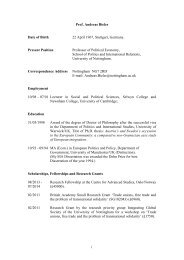Dr Gurnam Singh and Dr Stephen Cowden ... - Andreas Bieler
Dr Gurnam Singh and Dr Stephen Cowden ... - Andreas Bieler
Dr Gurnam Singh and Dr Stephen Cowden ... - Andreas Bieler
- No tags were found...
You also want an ePaper? Increase the reach of your titles
YUMPU automatically turns print PDFs into web optimized ePapers that Google loves.
13 | P a g etheir own subjective involvement in how <strong>and</strong> what they teach, they must also resistcalls to transform pedagogy into the mere application of st<strong>and</strong>ardized practicalmethods <strong>and</strong> techniques. Otherwise, teachers become indifferent to the ethical <strong>and</strong>political dimensions of their own authority <strong>and</strong> practice (Giroux, 2010 Para 24).In the process of responding to dem<strong>and</strong>s for developing new creative pedagogical approaches,we feel we have thrown out the baby with the bath water. Whilst technology can certainlyenhance <strong>and</strong> exp<strong>and</strong> pedagogical possibilities, it cannot be a substitute for developing the craftof teaching, which has been established over the past 3 millennia. And the key role here is toinduct students into the art of critical enquiry <strong>and</strong> 'intellectual conversations’, which enablesthem to become 'public actors' (Gouldner, 1979). In short, it is to become navigators ratherthan travellersWe believe the intellectual enterprise constitutes the very essence of university education <strong>and</strong>life <strong>and</strong> without it the university ceases to be a university. Therefore, it follows that with theadvent of mass HE we need to extol not denigrate the virtues of intellectual life; indeed, weneed to argue for mass intellectuality. As Monica Maclean in her book Pedagogy <strong>and</strong> theUniversity argues:"university teaching is an activity for intellectuals who are educating intellectuals; <strong>and</strong>teaching essential to the integrity of universities as places of intellectual activity"(Maclean, 2006 p106)When we mark students work we all lament the absence of critical thinking, but it is crucial torealise that this is not just a pedagogical problem but one of a deficit of imagination thatcommoditised sat-nav education encourages. Moreover, we believe this deficit of imagination<strong>and</strong> intellectuality is not only a reflection of the construction of student subjectivity, asconsumers, but also of our own experience as academics <strong>and</strong> the institutions that we areworking in.So before we seek to teach students how to make slow food, we need to reflect on our ownexperience <strong>and</strong> commitments to slow scholarship. If we become ambivalent about developingdeep learning <strong>and</strong> thinking, then we can’t be surprised if students do likewise. Put another way,the choice is ours; we can either behave as technicians <strong>and</strong> instructors assisting students tolearn how to input data into the sat-nav system or we can help them to read maps, to go offthe beaten track of certainty <strong>and</strong> to orientate them to find their way through what is often apainful, unpredictable, uncertain but ultimately extremely fulfilling terrain of learning.13 | P a g e



